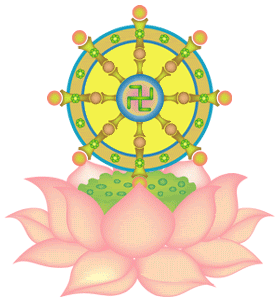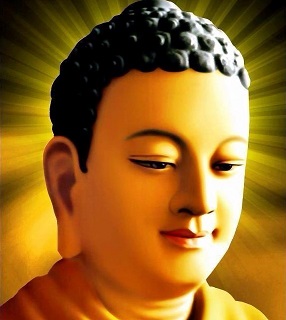Trang nhất » Tin Tức » KINH TẠNG
Tiểu Kinh Sư tử hống - Kinh Trung Bộ 1
Thứ tư - 28/10/2015 09:11Trung Bộ KinhMajjhima Nikaya11. Tiểu kinh Sư tử hống(Cùlasìhanàda sutta)Như vầy tôi nghe.Một thời Thế Tôn ở Savatthi (Xá-vệ), tại Jetavana (Kỳ-đà Lâm), trong vườn ông Anathapindika (Cấp Cô Ðộc). Ở đây, Thế Tôn gọi các Tỷ-kheo: "Này các Tỷ-kheo." --"Bạch Thế Tôn," những Tỷ-kheo ấy vâng đáp Thế Tôn. Thế Tôn thuyết như sau:-- Này các Tỷ-kheo, chỉ ở đây là có Sa-môn thứ nhất; ở đây là có Sa-môn thứ hai; ở đây là có Sa-môn thứ ba; ở đây là có Sa-môn thứ tư; các ngoại đạo khác không có Sa-môn. Này các Tỷ-kheo, các Ông hãy chân chánh rống tiếng rống sư tử như vậy.Này các Tỷ-kheo, sự tình này xảy ra khi ở đây những Du sĩ ngoại đạo có thể nói: "Chư Tôn giả có tin tưởng gì, có sức lực gì mà chư Tôn giả tuyên bố: 'Chỉ ở đây là có Sa-môn thứ nhất; ở đây là có Sa-môn thứ hai; ở đây là có Sa-môn thứ ba; ở đây là có Sa-môn thứ tư; các ngoại đạo khác không có Sa-môn'". Này các Tỷ-kheo, nếu được các Du sĩ ngoại đạo nói như vậy, cần phải trả lời họ như sau: "Chư Hiền, vì chúng tôi tự chánh kiến bốn pháp, được Thế Tôn tuyên bố cho chúng tôi biết, bậc đã thấy, đã biết, bậc A-la-hán, Chánh Ðẳng Giác nên chúng tôi nói: 'Chỉ ở đây là có Sa-môn thứ nhất, ở đây là có Sa-môn thứ hai; Sa-môn thứ ba; Sa-môn thứ tư'. Thế nào là bốn? Chư Hiền, chúng tôi có lòng tin bậc Ðạo Sư, có lòng tin Pháp, có sự thành tựu viên mãn các Giới luật, và những pháp hữu của chúng tôi, những người cư sĩ và những người xuất gia, được chúng tôi thương, chúng tôi mến. Chư Hiền, vì chúng tôi tự chánh kiến bốn pháp, được Thế Tôn tuyên bố cho chúng tôi biết, bậc đã thấy, đã biết, bậc A-la-hán, Chánh Ðẳng Giác nên chúng tôi nói: 'Chỉ ở đây là Sa-môn... Sa-môn thứ tư'".Này các Tỷ-kheo, sự tình này xảy ra, khi ở đây, những Du sĩ ngoại đạo có thể nói: "Chư Hiền, chúng tôi cũng có lòng tin bậc Ðạo Sư, vị ấy là Ðạo Sư của chúng tôi. Chúng tôi có lòng tin Pháp, Pháp ấy là Pháp của chúng tôi, chúng tôi thành tựu viên mãn các Giới luật, những Giới luật ấy là Giới luật của chúng tôi. Và những pháp hữu của chúng tôi, những người cư sĩ và cả những người xuất gia, được chúng tôi thương, được chúng tôi mến. Chư Hiền, như vậy có sự sai biệt gì, có sự đặc thù gì, có sự khác biệt gì giữa quý vị và chúng tôi?".Chư Tỷ-kheo, nếu được các Du sĩ ngoại đạo nói như vậy, cần phải trả lời họ như sau: "Chư Hiền, cứu cánh là một hay cứu cánh là đa diện?" Nếu trả lời đứng đắn, các Du sĩ ngoại đạo phải trả lời: "Chư Hiền, cứu cánh là một, cứu cánh không phải đa diện". --"Chư Hiền, cứu cánh ấy cho người có tham, hay cho người không tham?" Nếu trả lời đứng đắn, các Du sĩ ngoại đạo phải trả lời: "Chư Hiền, cứu cánh ấy cho người không tham, không phải cho người có tham". --"Chư Hiền, cứu cánh ấy cho người có sân, hay cho người không sân?" Nếu trả lời đứng đắn, các Du sĩ ngoại đạo phải trả lời: "Chư Hiền, cứu cánh ấy cho người không sân, không phải cho người có sân". --"Chư Hiền, cứu cánh ấy cho người có si hay cho người không si? Nếu trả lời đứng đắn... phải trả lời: "Chư Hiền, cứu cánh ấy cho người không si, không phải cho người có si". --"Chư Hiền, cứu cánh ấy cho người có ái, hay cho người không ái?" Nếu trả lời đứng đắn... phải trả lời: "Chư Hiền, cứu cánh ấy cho người không ái, không phải cho người có ái". --"Chư Hiền, cứu cánh ấy cho người có chấp thủ, hay cho người không chấp thủ?" Nếu trả lời đứng đắn... phải trả lời: "Chư Hiền, cứu cánh ấy cho người không chấp thủ, không phải cho người chấp thủ". --"Chư Hiền, cứu cánh ấy cho người có trí, hay cho người không có trí?" Nếu trả lời đứng đắn... phải trả lời: "Cứu cánh ấy cho người có trí, không phải cho người không có trí". --"Chư Hiền, cứu cánh ấy cho người thuận ứng, nghịch ứng hay cho người không thuận ứng, không nghịch ứng?" Nếu trả lời đứng đắn... phải trả lời: "Chư Hiền, cứu cánh ấy cho người không thuận ứng, không nghịch ứng, không phải cho người thuận ứng, nghịch ứng". --"Chư Hiền, cứu cánh ấy cho người ưa hý luận, thích hý luận hay cho người không ưa hý luận, không thích hý luận?" Nếu trả lời đứng đắn, các Du sĩ ngoại đạo cần phải trả lời: "Chư Hiền, cứu cánh ấy cho người không ưa hý luận, không thích hý luận, không phải cho người ưa hý luận, thích hý luận".Chư Tỷ-kheo, có hai loại tri kiến này: hữu kiến và phi hữu kiến. Chư Tỷ-kheo, những Sa-môn hay Bà-la-môn nào chấp trước hữu kiến, thân thiết hữu kiến, cố chấp hữu kiến; những vị ấy bị chướng ngại đối với phi hữu kiến. Chư Tỷ-kheo, những Sa-môn hay Bà-la-môn nào chấp trước phi hữu kiến, thân thiết phi hữu kiến, cố chấp phi hữu kiến; những vị ấy bị chướng ngại bởi hữu kiến.Chư Tỷ-kheo, những Sa-môn hay Bà-la-môn nào không như thật tuệ tri sự tập khởi và sự đoạn diệt của hai loại kiến này, vị ngọt, sự nguy hiểm và sự xuất ly của chúng, những vị này là những vị có tham, có sân, có si, có ái, có chấp thủ, không có trí, có thuận ứng, có nghịch ứng, có ưa hý luận, có thích hý luận; những vị ấy không giải thoát khỏi sanh, già, chết, sầu, bi, khổ, ưu, não. Ta nói những vị ấy không giải thoát khỏi đau khổ.Chư Tỷ-kheo, những Sa-môn hay Bà-la-môn nào như thật tuệ tri sự tập khởi và sự đoạn diệt của hai loại kiến này, vị ngọt, sự nguy hiểm, và sự xuất ly của chúng; những vị này là những vị không tham, không sân, không si, không ái, không chấp thủ, có trí, không có thuận ứng, không có nghịch ứng, không ưa hý luận, không thích hý luận; những vị ấy giải thoát khỏi sanh, già, chết, sầu, bi, khổ, ưu, não. Ta nói những vị ấy giải thoát khỏi đau khổ.Chư Tỷ-kheo, có bốn chấp thủ. Thế nào là bốn? Dục thủ, kiến thủ, giới cấm thủ, ngã luận thủ.Chư Tỷ-kheo, có những Sa-môn, Bà-la-môn tuy tự xưng liễu tri tất cả thủ, nhưng không chân chánh hiển thị sự liễu tri tất cả thủ; họ hiển thị sự liễu tri về dục thủ, nhưng không hiển thị sự liễu tri về kiến thủ, về giới cấm thủ, về ngã luận thủ. Vì sao vậy? Những Hiền giả Sa-môn, Bà-la-môn ấy không như thật tuệ tri ba sự. Do vậy, những Hiền giả Sa-môn, Bà-la-môn ấy tuy tự xưng liễu tri tất cả thủ, nhưng không chân chánh hiển thị sự liễu tri tất cả thủ. Họ hiển thị sự liễu tri về dục thủ, nhưng không hiển thị sự liễu tri về kiến thủ, về giới cấm thủ, về ngã luận thủ.Chư Tỷ-kheo, có những Sa-môn hay Bà-la-môn tuy tự xưng liễu tri tất cả thủ, nhưng không chân chánh hiển thị sự liễu tri tất cả thủ. Họ hiển thị sự liễu tri về dục thủ, sự liễu tri về kiến thủ nhưng không hiển thị sự liễu tri về giới cấm thủ, sự liễu tri về ngã luận thủ. Vì sao vậy? Những Hiền giả Sa-môn, Bà-la-môn ấy không như thật tuệ tri hai sự. Do vậy, những Hiền giả Sa-môn, Bà-la-môn ấy tuy tự xưng liễu tri tất cả thủ, nhưng không chơn chánh hiển thị sự liễu tri tất cả thủ. Họ hiển thị sự liễu tri về dục thủ, sự liễu tri về kiến thủ; nhưng không hiển thị sự liễu tri về giới cấm thủ, sự liễu tri về ngã luận thủ.Chư Tỷ-kheo, có những Sa-môn, Bà-la-môn tuy tự xưng liễu tri tất cả thủ, nhưng không chơn chánh hiển thị sự liễu tri tất cả thủ. Họ hiển thị sự liễu tri về dục thủ, sự liễu tri về kiến thủ, sự liễu tri về giới cấm thủ, nhưng không hiển thị sự liễu tri về ngã luận thủ. Vì sao vậy? Những Hiền giả Sa-môn, Bà-la-môn ấy không như thật tuệ tri một sự. Do vậy, những Hiền giả Sa-môn, Bà-la-môn ấy tuy tự xưng liễu tri tất cả thủ, nhưng không chân chánh hiển thị sự liễu tri tất cả thủ. Họ hiển thị sự liễu tri về dục thủ, sự liễu tri về kiến thủ, sự liễu tri về giới cấm thủ, nhưng không hiển thị sự liễu tri về ngã luận thủ.Chư Tỷ-kheo, trong Pháp và Luật như vậy, nếu có tịnh tín đối với Ðạo Sư, tịnh tín ấy được xem là không hoàn toàn; nếu có tịnh tín đối với Pháp, tịnh tín ấy được xem là không hoàn toàn; nếu có thành tựu viên mãn các Giới luật, sự thành tựu ấy được xem là không hoàn toàn; nếu có sự thương mến đối với những pháp hữu, sự thương mến ấy được xem là không hoàn toàn. Vì sao vậy? Chư Tỷ-kheo, sự tình là như vậy, trong một Pháp và Luật không khéo thuyết giảng, không khéo hiển thị, không có hướng thượng, không dẫn đến tịch tịnh, không được bậc Chánh Ðẳng Giác hiển thị.Và Như Tỷ-kheo, bậc Như Lai, A-la-hán, Chánh Ðẳng Giác tự xưng liễu tri tất cả thủ, chân chánh hiển thị sự liễu tri tất cả thủ. Như Lai hiển thị sự liễu tri về dục thủ, sự liễu tri về kiến thủ, sự liễu tri về giới cấm thủ, sự liễu tri về ngã luận thủ.Chư Tỷ-kheo, trong Pháp và Luật như vậy, nếu có tịnh tín đối với bậc Ðạo Sư, tịnh tín ấy được xem là hoàn toàn; nếu có tịnh tín đối với Pháp, tịnh tín ấy được xem là hoàn toàn; nếu có thành tựu viên mãn các Giới luật, sự thành tựu ấy được xem là hoàn toàn; nếu có sự thương mến đối với các pháp hữu, sự thương mến ấy được xem là hoàn toàn. Vì sao vậy? Chư Tỷ-kheo, sự tình là như vậy, trong một Pháp và Luật khéo thuyết giảng, khéo hiển thị, có hướng thượng, dẫn đến tịch tịnh, được bậc Chánh Ðẳng Giác hiển thị.Chư Tỷ-kheo, bốn loại chấp thủ này, lấy gì làm duyên, lấy gì làm tập khởi, lấy gì làm chủng, lấy gì làm nhân? Bốn loại chấp thủ này lấy ái làm duyên, lấy ái làm tập khởi, lấy ái làm chủng, lấy ái làm nhân. Chư Tỷ-kheo, ái này lấy gì làm duyên, lấy gì làm tập khởi, lấy gì làm chủng, lấy gì làm nhân? Chư Tỷ-kheo, ái này lấy thọ làm duyên, lấy thọ làm tập khởi, lấy thọ làm chủng, lấy thọ làm nhân. Chư Tỷ-kheo, thọ này lấy gì làm duyên, lấy gì làm tập khởi, lấy gì làm chủng, lấy gì làm nhân ? Chư Tỷ-kheo, thọ này lấy xúc làm duyên, lấy xúc làm tập khởi, lấy xúc làm chủng, lấy xúc làm nhân. Chư Tỷ-kheo, xúc này lấy gì làm duyên... lấy gì làm nhân? Chư Tỷ-kheo, xúc này lấy sáu nhập làm duyên... lấy sáu nhập làm nhân. Chư Tỷ-kheo, sáu nhập này lấy gì làm duyên... lấy gì làm nhân? Chư Tỷ-kheo, sáu nhập này lấy danh sắc làm duyên... lấy danh sắc làm nhân. Chư Tỷ-kheo, danh sắc này lấy gì làm duyên... lấy gì làm nhân? Chư Tỷ-kheo, danh sắc này lấy thức làm duyên... lấy thức làm nhân. Chư Tỷ-kheo, thức này lấy gì làm duyên... lấy gì làm nhân? Chư Tỷ-kheo, thức này lấy hành làm duyên... lấy hành làm nhân. Chư Tỷ-kheo, hành này lấy gì làm duyên... lấy gì làm nhân? Chư Tỷ-kheo, hành này lấy vô minh làm duyên... lấy vô minh làm nhân.Và Chư Tỷ-kheo, khi một Tỷ-kheo đã đoạn trừ vô minh, đã làm minh sanh khởi, vị ấy do vô minh được đoạn trừ, do minh sanh khởi, nên không chấp thủ dục thủ, không chấp thủ kiến thủ, không chấp thủ giới cấm thủ, không chấp thủ ngã luận thủ. Nhờ không chấp thủ nên không tháo động, nhờ không tháo động, nên tự thân chứng được Niết-bàn; vị ấy tuệ tri: "Sanh đã tận, phạm hạnh đã thành, việc nên làm đã làm, không còn trở lui trạng thái này nữa".Thế Tôn thuyết giảng như vậy. Các Tỷ-kheo ấy hoan hỷ, tín thọ lời dạy của Thế Tôn.Hòa thượng Thích Minh Châu dịch ViệtChân thành cám ơn anh HDC và nhóm Phật tử VH đã có thiện tâm gửi tặng ấn bản điện tử. (Bình Anson hiệu đính, dựa theo bản Anh ngữ "The Middle Length Discourses of the Buddha", Tỳ kheo Nanamoli và Tỳ kheo Bodhi dịch, 1995).Hiệu đính: 10-06-2004Majjhima Nikaya 11Culasihanada SuttaThe Shorter Discourse on the Lion's RoarTranslated from the Pali by Ñanamoli Thera edited and revised by Bhikkhu BodhiFor free distribution only, by arrangement with the Buddhist Publication Society1. Thus have I heard. On one occasion the Blessed One was living at Savatthi in Jeta's Grove, Anathapindika's Park. There he addressed the bhikkhus thus: "Bhikkhus." -- "Venerable sir," they replied. The Blessed One said this:2. "Bhikkhus, only here is there a recluse, only here a second recluse, only here a third recluse, only here a fourth recluse. The doctrines of others are devoid[*p.64] of recluses: that is how you should rightly roar your lion's roar.[1]3. "It is possible, bhikkhus, that wanderers of other sects might ask: 'But on the strength of what (argument) or with the support of what (authority) do the venerable ones say thus?' Wanderers of other sects who ask thus may be answered in this way: 'Friends, four things have been declared to us by the Blessed One who knows and sees, accomplished and fully enlightened; on seeing these in ourselves we say thus: "Only here is there a recluse, only here a second recluse, only here a third recluse, only here a fourth recluse. The doctrines of others are devoid of recluses." What are the four? We have confidence in the Teacher, we have confidence in the Dhamma, we have fulfilled the precepts, and our companions in the Dhamma are dear and agreeable to us whether they are layfolk or those gone forth. These are the four things declared to us by the Blessed One who knows and sees, accomplished and fully enlightened, on seeing which in ourselves we say as we do.'4. "It is possible, bhikkhus, that wanderers of other sects might say thus: 'Friends, we too have confidence in the Teacher, that is, in our Teacher; we too have confidence in the Dhamma, that is, in our Dhamma; we too have fulfilled the precepts, that is, our precepts; our companions in the Dhamma are dear and agreeable to us too whether they are layfolk or those gone forth. What is the distinction here, friends, what is the variance, what is the difference between you and us?'5. "Wanderers of other sects who ask thus may be answered in this way: 'How then, friends, is the goal one or many?' Answering rightly, the wanderers of other sects would answer thus: 'Friends, the goal is one, not many.'[2] -- 'But, friends, is that goal for one affected by lust or free from lust?' Answering rightly, the wanderers of other sects would answer thus: 'Friends, that goal is for one free from lust, not for one affected by lust.' -- 'But, friends, is that goal for one affected by hate or free from hate?' Answering rightly, they would answer: 'Friends, that goal is for one free from hate, not for one affected by hate.' -- 'But, friends, is that goal for one affected by delusion or free from delusion?' Answering rightly, they would answer: 'Friends, that goal is for one free from delusion, not for one affected by delusion.' -- 'But, friends, is that goal for one affected by craving or free from craving?'[*p.65] Answering rightly, they would answer: 'Friends, that goal is for one free from craving, not for one affected by craving.' -- 'But, friends, is that goal for one affected by clinging or free from clinging?' Answering rightly, they would answer: 'Friends, that goal is for one free from clinging, not for one affected by clinging.' -- 'But, friends, is that goal for one who has vision or for one without vision?' Answering rightly, they would answer: 'Friends, that goal is for one with vision, not for one without vision.' -- 'But, friends, is that goal for one who favours and opposes, or for one who does not favour and oppose?' Answering rightly, they would answer: 'Friends, that goal is for one who does not favour and oppose, not for one who favours and opposes.'[3] -- 'But, friends is that goal for one who delights in and enjoys proliferation, or for one who does not delight in and enjoy proliferation?' Answering rightly, they would answer: 'Friends, that goal is for one who does not delight in and enjoy proliferation, not for one who delights in and enjoys proliferation.'[4]6. "Bhikkhus, there are these two views: the view of being and the view of non-being. Any recluses or brahmins who rely on the view of being, adopt the view of being, accept the view of being, are opposed to the view of non-being. Any recluses or brahmins who rely on the view of non-being, adopt the view of non-being, accept the view of non-being, are opposed to the view of being.[5]7. "Any recluses or brahmins who do not understand as they actually are the origin, the disappearance, the gratification, the danger and the escape[6] in the case of these two views are affected by lust, affected by hate, affected by delusion, affected by craving, affected by clinging, without vision, given to favouring and opposing, and they delight in and enjoy proliferation. They are not freed from birth, aging and death, from sorrow, lamentation, pain, grief and despair; they are not freed from suffering, I say.8. "Any recluses or brahmins who understand as they actually are the origin, the disappearance, the gratification, the danger and the escape in the case of these two views are without lust, without hate, without delusion, without craving, without clinging, with vision, not given to favouring and opposing, and they do not delight in and enjoy proliferation. They are freed from birth, aging and death, from sorrow, lamentation, pain, grief and despair; they are freed from suffering, I say.[*p.66]9. "Bhikkhus, there are these four kinds of clinging. What four? Clinging to sensual pleasures, clinging to views, clinging to rules and observances, and clinging to a doctrine of self.10. "Though certain recluses and brahmins claim to propound the full understanding of all kinds of clinging, they do not completely describe the full understanding of all kinds of clinging.[7] They describe the full understanding of clinging to sensual pleasures without describing the full understanding of clinging to views, clinging to rules and observances, and clinging to a doctrine of self. Why is that? Those good recluses and brahmins do not understand these three instances of clinging as they actually are. Therefore, though they claim to propound the full understanding of all kinds of clinging, they describe only the full understanding of clinging to sensual pleasures without describing the full understanding of clinging to views, clinging to rules and observances, and clinging to a doctrine of self.11. "Though certain recluses and brahmins claim to propound the full understanding of all kinds of clinging...they describe the full understanding of clinging to sensual pleasures and clinging to views without describing the full understanding of clinging to rules and observances and clinging to a doctrine of self. Why is that? They do not understand two instances...therefore they describe only the full understanding of clinging to sensual pleasures and clinging to views without describing the full understanding of clinging to rules and observances and clinging to a doctrine of self.12. "Though certain recluses and brahmins claim to propound the full understanding of all kinds of clinging...they describe the full understanding of clinging to sensual pleasures, clinging to views, and clinging to rules and observances without describing the full understanding of clinging to a doctrine of self. They do not understand one instance...therefore they describe only the full understanding of clinging to sensual pleasures, clinging to views, and clinging to rules and observances without describing the full understanding of clinging to a doctrine of self.[8]13. "Bhikkhus, in such a Dhamma and Discipline as that it is plain that confidence in the Teacher is not rightly directed, that confidence in the Dhamma is not rightly directed, that fulfilment of the precepts is not rightly directed, and that the affection among companions in the Dhamma is not rightly directed. Why is that? Because that is how it is when the Dhamma and Discipline is[*p.67] badly proclaimed and badly expounded, unemancipating, unconducive to peace, expounded by one who is not fully enlightened.14. "Bhikkhus, when a Tathagata, accomplished and fully enlightened, claims to propound the full understanding of all kinds of clinging, he completely describes the full understanding of all kinds of clinging: he describes the full understanding of clinging to sensual pleasures, clinging to views, clinging to rules and observances, and clinging to a doctrine of self.[9]15. "Bhikkhus, in such a Dhamma and Discipline as that it is plain that confidence in the Teacher is rightly directed, that confidence in the Dhamma is rightly directed, that fulfilment of the precepts is rightly directed, and that the affection among companions in the Dhamma is rightly directed. Why is that? Because that is how it is when the Dhamma and Discipline is well proclaimed and well expounded, emancipating, conducive to peace, expounded by one who is fully enlightened.16. "Now these four kinds of clinging have what as their source, what as their origin, from what are they born and produced? These four kinds of clinging have craving as their source, craving as their origin, they are born and produced from craving.[10] Craving has what as its source...? Craving has feeling as its source...Feeling has what as its source...? Feeling has contact as its source...Contact has what as its source...? Contact has the sixfold base as its source...The sixfold base has what as its source...? The sixfold base has mentality-materiality as its source...Mentality-materiality has what as its source...? Mentality-materiality has consciousness as its source...Consciousness has what as its source...? Consciousness has formations as its source...Formations have what as their source...? Formations have ignorance as their source, ignorance as their origin; they are born and produced from ignorance.17. "Bhikkhus, when ignorance is abandoned and true knowledge has arisen in a bhikkhu, then with the fading away of ignorance and the arising of true knowledge he no longer clings to sensual pleasures, no longer clings to views, no longer clings to rules and observances, no longer clings to a doctrine of self.[11] When he does not cling, he is not agitated. When he is not agitated, he personally attains Nibbana. He understands: 'Birth is destroyed, the holy life has been lived, what had to be done has been done, there is no more coming to any state of being.'"[12] [*p.68]That is what the Blessed One said. The bhikkhus were satisfied and delighted in the Blessed One's words.Notes[*p.###] The page numbers enclosed in square brackets in the above text are the page numbers of the Pali Text Society edition of the Pali text.1. Comy. explains "lion's roar" (sihanada) as meaning a supreme roar (setthanada), a fearless roar (abhitanada), and a roar which cannot be confuted (appatinada). It adds: The roar about the existence of these four types of recluse only here is the supreme roar. The absence of any fear on account of others when one advances such a claim makes it a fearless roar. As none of the rival teachers can rise up and say, "These recluses also exist in our Dispensation," it is a roar which cannot be confuted. [Go back]2. Comy.: Even though the adherents of other sects all declare Arahantship -- understood in a general sense as spiritual perfection -- to be the goal, they point to other attainments as the goal in accordance with their views. Thus the brahmins declare the Brahma-world to be the goal, the great ascetics declare the gods of Streaming Radiance, the wanderers the gods of Refulgent Glory, and the Ajivakas the non-percipient state, which they posit to be "infinite mind" (anantamanasa). [Go back]3. "Favouring and opposing" (anurodha-pativirodha): reacting with attraction through lust and with aversion through hatred. [Go back]4. Proliferation (papañca), according to Comy., generally means mental activity governed by craving, conceit and views, but here only craving and views are intended. [Go back]5. The adoption of one view entailing opposition to the other links up with the earlier statement that the goal is for one who does not favour and oppose. [Go back]6. Comy. mentions eight conditions which serve as the origin (samudaya) of these views: the five aggregates, ignorance, contact, perception, thought, unwise attention, bad friends, and the voice of another. Their disappearance (atthangama) is the path of stream-entry, which eradicates all wrong views. Their gratification (assada) may be understood as the satisfaction of psychological need to which the view caters, specifically the nurturing of craving for being by the eternalist view and of craving for non-being by the annihilationist view. Their danger (adinava) is the continued bondage they entail, by obstructing the acceptance of right view, which leads to liberation. And the escape from them (nissarana) is Nibbana. [Go back]7. Comy. glosses full understanding (pariñña) here as overcoming (samatikkama), with reference to the commentarial notion of pahanapariñña, "full understanding as abandonment." [Go back]8. This passage clearly indicates that the critical differentiating factor of the Buddha's Dhamma is its "full understanding of clinging to a doctrine of self." This means, in effect, that the Buddha alone is able to show how to overcome all views of self by developing penetration into the truth of non-self (anatta). [Go back]9. Comy.: The Buddha teaches how clinging to sense pleasures is abandoned by the path of Arahantship, while the other three types of clinging are eliminated by the path of stream-entry. The path of stream-entry eliminates the other three clingings because these three are all forms of wrong view, and all wrong views are overcome at that stage. Although the statement that clinging to sense pleasures is abandoned by the path of Arahantship may sound strange, in view of the fact that sensual desire is already eliminated by the non-returner, the Tika (subcommentary) to the sutta explains that in the present context the word kama, sense pleasure, should be understood to comprise all forms of greed, and the subtler types of greed are only eliminated with the attainment of Arahantship. [Go back]10. This passage is explained in order to show how clinging is to be abandoned. Clinging is traced back, via the chain of dependent arising, to its root-cause in ignorance, and then the destruction of ignorance is shown to be the means to eradicate clinging. [Go back]11. The Pali idiom, n'eva kamupadanam upadiyati, would have to be rendered literally as "he does not cling to the clinging to sense pleasures," which may obscure the sense more than it illuminates it. The word upadana in Pali is the object of its own verb form, while "clinging" in English is not. The easiest solution is to translate directly in accordance with the sense rather than to try to reproduce the idiom in translation. [Go back]12. This is the stock canonical declaration of Arahantship. [Go back]
Từ khóa:
thế tôn, các tỷ-kheo, như sau, đây là, có sa-môn, thứ nhất, thứ hai, thứ ba, thứ tư, ngoại đạo, chân chánh, sự tình, du sĩ, gì có, tuyên bố, như vậy, cần phải, trả lời, chư hiền, chúng tôi, biết bậc, a-la-hán chánh, ðẳng giác, có lòng, bậc ðạo, có sự, thành tựu, viên mãn, các giới, và những, pháp hữu, những người, thương mến, vị ấy, của chúng, cứu cánh, nếu đứng, đắn các, không phải
Những tin mới hơn
Những tin cũ hơn
•Tin Được Quan Tâm Nhiều
-
 Nhóm Thiện Nguyện Tịnh xá Ngọc Sơn ủng hộ từ thiện nhân mùa Phật Đản tại Ấn Độ.
Nhóm Thiện Nguyện Tịnh xá Ngọc Sơn ủng hộ từ thiện nhân mùa Phật Đản tại Ấn Độ.
Bố thí là nền tảng cơ bản để kết nối yêu thương, sẻ chia cuộc sống nhằm làm vơi bớt nỗi đau bất hạnh... -
 KHÓA TU MỘT NGÀY CHÁNH NIỆM NIỆM PHẬT TẠI TỊNH XÁ NGỌC SƠN.
KHÓA TU MỘT NGÀY CHÁNH NIỆM NIỆM PHẬT TẠI TỊNH XÁ NGỌC SƠN.
Vào lúc 8 giờ sáng ngày 21/10/2017 (nhằm ngày 2/9/ Đinh Dậu), khóa tu một ngày Chánh Niệm Niệm Phật... -
 Bữa cơm chuyển nghiệp lần 5
Bữa cơm chuyển nghiệp lần 5
Sáng ngày 12/10/2017 ( Nhằm ngày 23/8/ Đinh Dậu), chư tăng và Phật tử Tịnh xá Ngọc Sơn đã thân lâm... -
 Phát quà trung thu và trao học bổng cho các cháu thiếu nhi
Phát quà trung thu và trao học bổng cho các cháu thiếu nhi
Tết Trung thu là một trong những lễ hội truyền thống có ý nghĩa quan trọng trong đời sống văn hóa... -
 Chương trình đón mừng đại lễ Phật Đản PL. 2560 tại Tịnh xá Ngọc Sơn
Chương trình đón mừng đại lễ Phật Đản PL. 2560 tại Tịnh xá Ngọc Sơn
Vào lúc 18 giờ ngày 14/4/ Bính Thân, dưới sự chứng minh của TT. Giác Trí cùng chư tôn Đức Tăng, Ni,... -
 Đại lễ Khánh thành bảo tháp Xá lợi Phật - Tịnh xá Ngọc Sơn
Đại lễ Khánh thành bảo tháp Xá lợi Phật - Tịnh xá Ngọc Sơn
Sáng ngày 7.4.2016 (01.3. Bính Thân) Tịnh xá Ngọc Sơn, xã Phước Sơn, huyện Tuy Phước, tỉnh Bình Định... -
 Công trình Bảo tháp xá-lợi ở TX. Ngọc Sơn
Công trình Bảo tháp xá-lợi ở TX. Ngọc Sơn
Nhằm tạo điều kiện cho mọi người không đủ phước duyên đến các nước để chiêm bái xá-lợi, Thượng tọa... -
 Lễ khánh thành bảo tháp thờ xá lợi Phật tại Tịnh xá Ngọc Sơn
Lễ khánh thành bảo tháp thờ xá lợi Phật tại Tịnh xá Ngọc Sơn
Ngày 7/4/1016 (nhằm ngày 01/3 năm Bính Thân), PL. 2559 tại Tịnh xá Ngọc Sơn, xã Phước Sơn, huyện Tuy...
•Tập San Đuốc Sen
-
 Nhóm Thiện Nguyện Tịnh xá Ngọc Sơn ủng hộ từ thiện nhân mùa Phật Đản tại Ấn Độ.
Nhóm Thiện Nguyện Tịnh xá Ngọc Sơn ủng hộ từ thiện nhân mùa Phật Đản tại Ấn Độ.
Bố thí là nền tảng cơ bản để kết nối yêu thương, sẻ chia cuộc sống nhằm làm vơi bớt nỗi đau bất hạnh... -
 KHÓA TU MỘT NGÀY CHÁNH NIỆM NIỆM PHẬT TẠI TỊNH XÁ NGỌC SƠN.
KHÓA TU MỘT NGÀY CHÁNH NIỆM NIỆM PHẬT TẠI TỊNH XÁ NGỌC SƠN.
Vào lúc 8 giờ sáng ngày 21/10/2017 (nhằm ngày 2/9/ Đinh Dậu), khóa tu một ngày Chánh Niệm Niệm Phật... -
 Bữa cơm chuyển nghiệp lần 5
Bữa cơm chuyển nghiệp lần 5
Sáng ngày 12/10/2017 ( Nhằm ngày 23/8/ Đinh Dậu), chư tăng và Phật tử Tịnh xá Ngọc Sơn đã thân lâm... -
 Phát quà trung thu và trao học bổng cho các cháu thiếu nhi
Phát quà trung thu và trao học bổng cho các cháu thiếu nhi
Tết Trung thu là một trong những lễ hội truyền thống có ý nghĩa quan trọng trong đời sống văn hóa... -
 Chương trình đón mừng đại lễ Phật Đản PL. 2560 tại Tịnh xá Ngọc Sơn
Chương trình đón mừng đại lễ Phật Đản PL. 2560 tại Tịnh xá Ngọc Sơn
Vào lúc 18 giờ ngày 14/4/ Bính Thân, dưới sự chứng minh của TT. Giác Trí cùng chư tôn Đức Tăng, Ni,... -
 Đại lễ Khánh thành bảo tháp Xá lợi Phật - Tịnh xá Ngọc Sơn
Đại lễ Khánh thành bảo tháp Xá lợi Phật - Tịnh xá Ngọc Sơn
Sáng ngày 7.4.2016 (01.3. Bính Thân) Tịnh xá Ngọc Sơn, xã Phước Sơn, huyện Tuy Phước, tỉnh Bình Định... -
 Công trình Bảo tháp xá-lợi ở TX. Ngọc Sơn
Công trình Bảo tháp xá-lợi ở TX. Ngọc Sơn
Nhằm tạo điều kiện cho mọi người không đủ phước duyên đến các nước để chiêm bái xá-lợi, Thượng tọa...
•Chia Sẻ Cùng Bạn Đọc
-
 Văn cảm tưởng về Thầy nhân mùa Vu Lan Báo Hiếu
Văn cảm tưởng về Thầy nhân mùa Vu Lan Báo Hiếu
Hôm nay nhân mùa Vu lan báo hiếu, Thầy cho chúng con được dâng lên lời cảm niệm này, thành kính cúng... -
 CLB Tình nguyện Sen Hồng sinh hoạt buổi đầu tiên
CLB Tình nguyện Sen Hồng sinh hoạt buổi đầu tiên
Ngày 17/4/2016, dưới sự chứng minh của HT. Giác Pháp - Chủ nhiệm Câu lạc bộ Tình nguyện Sen Hồng,... -
 Ông Bụt của tôi
Ông Bụt của tôi
-
 Giá trị của công việc
Giá trị của công việc
Một chàng trai trẻ vừa tốt nghiệp Đại học loại xuất sắc nộp đơn dự tuyển vào vị trí quản lý cấp thấp... -
 Giá trị của cuộc sống
Giá trị của cuộc sống
Cuộc sống luôn 'nói chuyện' với ta qua những điều giản dị và không ngờ đến nhất.
•Hình Ảnh Tịnh Xá Ngọc Sơn
 |
 |

 Xem phản hồi
Xem phản hồi Gửi phản hồi
Gửi phản hồi






